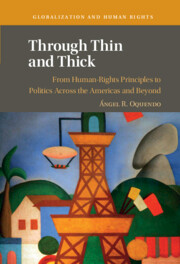
- Publisher:
- Cambridge University Press
- Online publication date:
- June 2022
- Print publication year:
- 2022
- Online ISBN:
- 9781108776288

The book launches with examples, concrete cases, or political confrontations to explain how to conceive the safeguards at stake. It portrays these as embodying principles requiring particular actions and the implementation of policies. For instance, free speech demands permitting seemingly offensive expression plus promoting a diverse and open public debate. The work scrutinizes specific guaranties, such as those pertaining to asylum, citizenship, abortion, due process, self-determination, or the environment. It presents them as engendering problems peculiar to them. Next, the discussion dissects how precepts, like human rights and democracy, may contingently clash despite their overall commensurability. Finally, it underscores the interconnection of negative, substantive, and national entitlements with their positive, procedural, and international counterparts. Throughout, ruminations on the following questions unfold: How may courts and governments respectively contribute to actualizing the liberties at issue? How do these bear upon social justice? How may ideologically opposed states nonetheless collaborate on them?
‘Ángel Oquendo powerfully deploys close readings of concrete conflicts - with a special focus on Latin America and the Inter-American System - to argue that human rights, in their best elaboration, are sound in neither politics nor law, but instead arise out of an unresolvable conflict between the two. A hermeneutic upheaval of a book.'
Daniel Markovits - Guido Calabresi Professor of Law, Yale Law School
‘This brilliantly unconventional book demonstrates how a learned scholar combines deep political-philosophical conceptual analysis with thick descriptions of cases and facts on the ground to interrogate the promises and challenges for the Inter-American human rights system. Going from concepts of human rights derived from both inside and outside the region, Oquendo takes on the recent challenges of the Bolivian/Andes nations to the multi-national court that has been both a leader and a follower in the globalization and politicization of human rights. A must-read for any student of human rights and justice in Latin America and beyond.'
Carrie Menkel-Meadow - Distinguished Professor of Law and Political Science, University of California, Irvine, and A. B. Chettle Jr. Professor of Law, Dispute Resolution, and Civil Procedure, Emerita, Georgetown University Law Center
'Through Thin and Thick advances a progressive, decolonizing and emancipatory vision of human rights. Oquendo develops a post-doctrinal, dialogic account of how courts and other legal institutions facilitate principled conversation about the politics of human rights law between and among states and civil society. The book offers a compelling defense of human rights theory and practice as an institutionalized political conversation about the reach and rule of law.'
Kendall Thomas - Nash Professor of Law, Columbia University
 Loading metrics...
Loading metrics...
* Views captured on Cambridge Core between #date#. This data will be updated every 24 hours.
Usage data cannot currently be displayed.